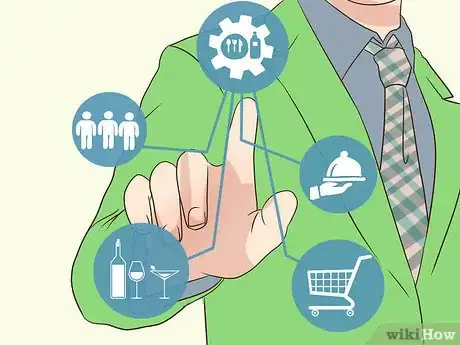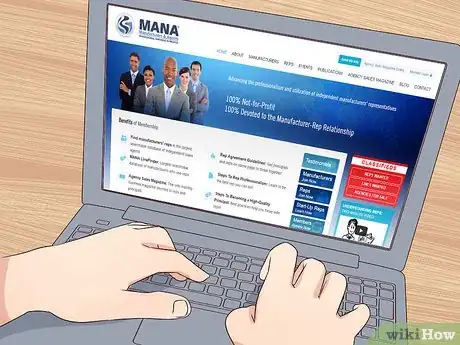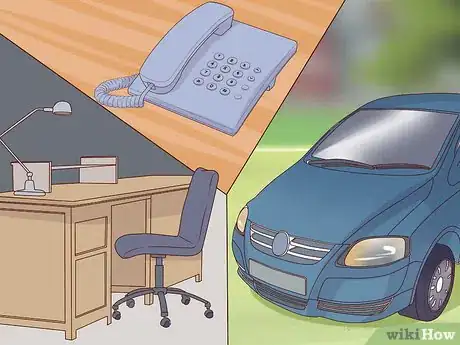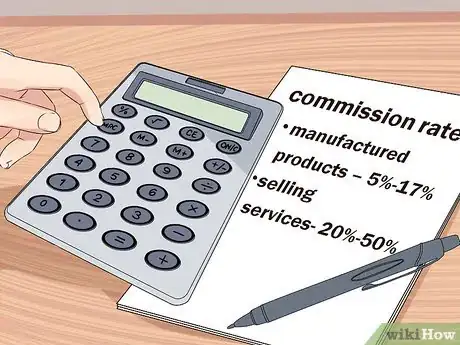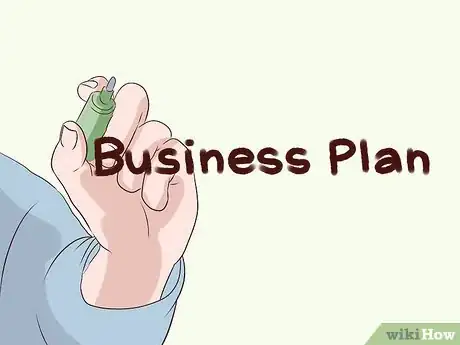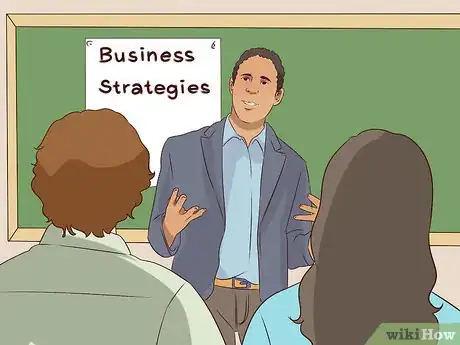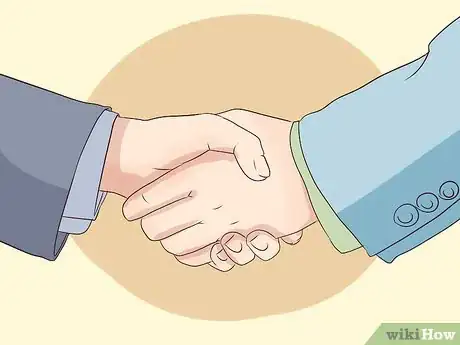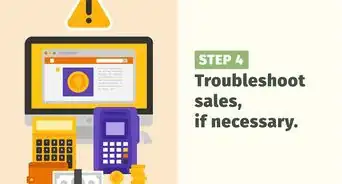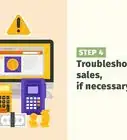This article was co-authored by wikiHow Staff. Our trained team of editors and researchers validate articles for accuracy and comprehensiveness. wikiHow's Content Management Team carefully monitors the work from our editorial staff to ensure that each article is backed by trusted research and meets our high quality standards.
There are 7 references cited in this article, which can be found at the bottom of the page.
wikiHow marks an article as reader-approved once it receives enough positive feedback. In this case, 89% of readers who voted found the article helpful, earning it our reader-approved status.
This article has been viewed 90,652 times.
Learn more...
Independent sales reps work outside of their associated company offices, and are a bit like business partners to the companies they represent. They often sell a number of product lines from a number of different companies. They must oversee every aspect their operations, including marketing, customer service, order processing, and accounting. Perks include setting your own schedule, protecting your income by diversifying the products you offer, and your income is not capped. While having a strong background in sales, knowledge of the products or services you’re selling, and an existing client base make starting out much easier, you do not need specialized training or specific experience to work in this sales field.
Steps
Evaluating Your Skills and Attributes
-
1Make sure you’re a self-starter. In order to be a successful independent sales rep, you’ll need complete confidence in your abilities as a salesperson. In addition to a strong skill set and confidence in your abilities, you’ll need to be able to rely on yourself to be your own boss
- The most important aspect of being a successful independent sales rep is the ability to motivate yourself. Remember that self-employment requires an incredible amount of discipline.
- Be aware that, especially when you’re just starting out, you will likely work more than 40 hours per week. As you build your product portfolio and client base, you should be comfortable with working closer to 60 hours per week.
- You’ll need strong time management skills in order to maximize your efficiency and make the most of your time.
-
2Strengthen your communications and interpersonal skills. Ideally, if you’re thinking of becoming an independent sales rep, you have excellent oral and written communication skills. You should be able to target the way you communicate to different audiences. You should also be able to easily find compromises that benefit parties on either side of a sales deal.[1]
- Think about taking a writing course at a local community college. Focus on learning to write for different audiences. Ask any friends or family who write well to go over grammar and style rules with you.
- Try taking on a part-time service job, such as in retail, as a restaurant server, or answering a customer service phone line. Improve your oral communications skills by paying close attention to how your customers speak and act. Pay attention to how you speak to your customers, and try to target how you communicate to the various people you encounter.
- An independent sales agent is responsible for making the product’s manufacturer happy and satisfying the buyer’s needs. Since they’re responsible for their own income management, an independent rep must also fit their own satisfaction into the equation.
- Strong interpersonal and problem solving skills are absolutely necessary in order to land a deal that benefits these various parties.
Advertisement -
3Develop your sales experience. Independent sales reps are typically highly experienced, with years of employment in a particular field under their belt. Having significant experience in sales gives you a knowledge base about products or a specific market, helps you develop the skills necessary to be a great sales agent, and typically gives you a robust client base.[2]
- If you don't have any sale experience, think about applying for an sales job on a company's in-house team to learn and master the basics.
- If you have a background in sales, decide which products and industries you know best as you select which company or product line you’d like to represent as an outside agent.
- If you’re currently employed with a company as an in-house sales agent, consider your available opportunities. If you think a promotion is possible in the near future, or if you believe you could learn more about the industry or strengthen your network, consider remaining in your current position for several months or a year before becoming an independent rep.[3]
-
4Think about your existing network and potential client base. Don’t reinvent the wheel if you don’t have to: think about who and what you already know. Before you decide to become an independent rep consider if your network is heavy in a given industry and therefore includes lots of potential buyers
- Before you go with a particular company or product, think about what would be easiest to sell. If you spent a long time in the food industry and know people in purchasing at restaurants and grocery stores, consider selling food, beverages, or spirits, or products associated with food service.
Starting Out
-
1Learn as much as you can about independent sales. Read books, attend seminars, and take on-site or online courses. Ask around your network and seek guidance from other successful salespeople. Ask about pros and cons from experienced independent sales agents.
- Consider joining a relevant professional organization for manufacturers and independent sales agents, such as MANA: https://www.manaonline.org/
- Think about joining a trade association for individual industries that you might have experience with, like food service or HVAC.[4]
-
2Have a home office, phone, and car. Most independent sales reps only need a home office space and reliable automobile in order to work.[5] While these are the most obvious aspects of your startup costs, you should nonetheless consider all potential costs of operating your independent career, from paying for the internet to acquiring a professional wardrobe to paying for business cards.
- Consider the visual impact of your car. You will like find little success if you drive up to a manufacturing company or to a potential buyer with a beat-up, barely drivable car.
- Remember that since you’re self-employed, there’s no company-provided office supply closet to raid, especially when you’re just starting. Later down the road, you’ll likely get reimbursed for expenses after you’ve secured a relationship with the company whose products you’re selling.
-
3Make sure you have savings or another source of income. While startup costs are low, it can take time before you earn an income that will support you or your family. When you’re just starting out, make sure you have a significant amount of money saved, at least enough to cover the majority of living expenses for up to six months. Alternatively, work a part-time job to cover your living expenses as you start your new career.
- If you are married or have a family, make sure your spouse or other family members understand the monetary sacrifices that come with starting any new career.[6]
- Have a conversation with your spouse about setting a long-term budget, cutting expenses, and about any potential travel or time away from home that your new career will entail.
-
4Find a desirable company or product line. It’s always easiest to stick with the industries you know best. In addition to your existing knowledge base, think about your location as you search for a manufacturer or products to sell. Find out if an industry or particular brand dominates your geographic location, so that you won’t have to spend extra effort creating a new market share.
- For example, if everyone in your area knows a brand, its logo, and what products it makes, you should spend some time researching that brand to see how it sells its products. Look on their website to see if they have an in-house sales force or use independent agents.
- If you’ve spent years as automotive technician and know every product a mechanic would ever need like the back of your hand, look for companies that produce those products. Search their websites to find out how they sell their products.
-
5Apply to jobs. Once you have a pool of companies you'd like to work with, look on their sites for job postings for independent sales reps. Input the company name onto your preferred job search website. Expand your search to any postings for independent sales reps in your area.
- Even if you can’t find any open independent positions, write a letter or email of interest to the human resources department or to any sales executives or supervisors listed on their website. Be sure to mention your expertise and experience in addition to your sincere interest in selling their products.
- Ask around your network, especially if you have a background in a given industry. Think about anyone you might know who can point you in the direction of a job prospect, such as someone who works for a manufacturing company or for a software developer.
- Your chamber of commerce may also be able to lead you to local businesses who are in need of independent sales reps.
-
6Calculate your commission rate. A sales commission is the percentage of money made from a sale that forms your income. As an independent sales agent, your income will be entirely commissions-based. While there’s no set formula, and commissions are always negotiable, selling manufactured products typically generates 7 to 15% of the sale’s value. Selling services, such as software, typically yields a commission rate of 20 to 50% of sales
- Services generate higher rates because you generally need more expertise if you’re selling something like software, and because manufactured products generally cost more to produce.
- Always negotiate your commission rate when you’re starting out with a new company. Don’t take their first offer. Say, “9% is a little beneath the expected threshold for this product. 14% is a more appropriate rate.” Expect to meet somewhere in the middle.
-
7Build a portfolio of related, non-competing products. Once you’ve successfully made contact with a manufacturer, you’ll need to demonstrate to them that you have ample experience as a professional salesperson. Interview processes vary, and you may or may not sign a contractual agreement. Once you agree to work with a company, they’ll provide you with any training you need in order to successfully sell their product.[7]
- When you start representing a company’s product, you’ll then spend most of your time making phone calls to potential buyers, visiting trade shows, or making in-person demonstrations in order to land sales.
- Once you’ve begun selling one product or product line, it’ll be easier to add other, related products to your portfolio. You’ll likely have signed a contract with a non-competitive clause, so be sure that any new products that you add to your portfolio are not in direct competition with your previous product.
- In other words, never sell two of the same thing, especially if you could get in trouble for it.
-
8Be smart about signing contracts. When signing a contract to sell a company's product or service, it's important to read and understand its terms. Try to make sure it avoids ambiguity, addresses renewal, termination, and is open to amendments or changes.[8]
- When it comes to renewal, a great contract will give both parties the opportunity to exit the contract upon renewal. Avoiding automatic renewal helps to guarantee your relationship with the supplier is based on both parties' performances. Consider showing your contract to your lawyer, obtaining a standard rep contract from your industry's trade association, or asking around your network for advice.
- Try to negotiate a contract that allows for termination for cause and for convenience. This means that you'll have to option to back out of the contract (typically with 30 days notice) if you need to without the threat of a legal skirmish. Make sure both sides are on equal footing and that either can terminate the partnership.
- The best representative contracts allow changes to be made at any time or at regular intervals throughout the year.
- Make sure any contract you sign defines what happens after termination. Make sure it defines how many days notice a party must give and determines how commissions are calculated. For example, if you've earned a commission on shipments that are sent after the date of termination, make sure the contract states that you're to be paid what you're due after termination. You and the supplier should both document all sales that earn you commission following the contract's termination date.
Building a Successful Business
-
1Create your business. Check with your state or national government's business regulatory agency to find out what type of licensing is required for you to practice as an independent sales rep in your area. Make your business as professional as possible:
- Design a simple logo or ask for help from graphic designer friends.
- Hand out business cards and other informational materials that are appropriate for your industry.
-
2Develop an online presence for your business. Create a website that lists your available products, credentials, and contact information. Set up and manage social networking accounts. Contribute to industry-related online forums, and create a blog.
- Be sure to include a link back to your website in all of your forum, blog and social networking posts.
-
3Continue to expand your customer and knowledge bases. Always be on the lookout for more potential buyers and new markets. Keep yourself educated about your chosen industry so that you can be a more competitive and attractive potential sales agent for both manufacturers and buyers.[9]
- Attend conferences, seminars and trade shows related to the industry you are interested in and approach vendors about possible independent sales opportunities.
- Attend networking events. Find events related to your industry in the local classifieds, in the community section of classifieds sites like Craigslist and on websites like Meetup.com. Meet as many people as you can, hand out business cards and follow-up with useful contacts.
- Advertise your independent sales rep offerings in newspapers, magazines, trade publications, classifieds websites and industry-related web directories. For example, if you choose to represent a computer hardware manufacturer, you can advertise in technology magazines and in the technology section of your local newspaper.
-
4Hire sub-contractors or sub-agents. As you continue to grow your customer base and become a more reputable presence in your industry, you might find yourself ready to hire others to work for you. Before starting a multi-person agency, think about how reputable and reliable your services and accounts have been to date. Don’t think about expanding unless you have multiple accounts that you know for a fact will continue to be good sources of revenue.[10]
- When expanding your business, craft a business plan with reasonable expectations and specific objectives. Designate specific accounts or products that you’ll delegate to new hires. Use these estimates to decide how many sub-agents you should hire.
- Set specific goals for your new hires and their assigned accounts. Using your past income, forecast conservative expectations for commissions generated.
- When added sub-agents to your business, focus on customer service. Make sure that anyone you add to your team will deliver the same high quality service that brought you success.[11]
Community Q&A
-
QuestionI would like to Represent a Spa, Retreat or Resort, what steps do I need to do? Are there websites I can search?
 Community AnswerLook in your area for spa, retreats, or resorts in your area. Look on their website to find names and contact info for their owners or managing staff. Write a letter or email to ask them about any services they might require related to outside sales. Ask them if they think they'd benefit from an outside representative to build their clientele. Show them your resume and offer them examples of your past success that might be applicable. Be polite and professional, but be persistent.
Community AnswerLook in your area for spa, retreats, or resorts in your area. Look on their website to find names and contact info for their owners or managing staff. Write a letter or email to ask them about any services they might require related to outside sales. Ask them if they think they'd benefit from an outside representative to build their clientele. Show them your resume and offer them examples of your past success that might be applicable. Be polite and professional, but be persistent.
References
- ↑ https://www.manaonline.org/reps/starting-an-agency/so-youre-thinking-of-becoming-an-agent-part-1/
- ↑ https://www.cpsa.com/articles/is-working-as-an-independent-sales-representative-for-you
- ↑ https://www.manaonline.org/reps/starting-an-agency/so-youre-thinking-of-becoming-an-agent-part-3/
- ↑ https://www.entrepreneur.com/article/70662
- ↑ https://www.entrepreneur.com/article/70662
- ↑ https://www.manaonline.org/reps/starting-an-agency/a-necessary-reality-check/
- ↑ https://www.entrepreneur.com/article/70662
- ↑ http://expertpages.com/news/top_10_mistakes_in_representative_contracts.htm
- ↑ https://www.entrepreneur.com/article/70662



